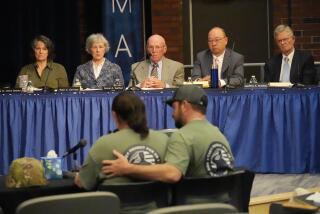Panel Cites Broad Security Failures in Saudi Bombing
- Share via
WASHINGTON — An independent panel investigating the June 25 truck-bombing that killed 19 U.S. Air Force personnel at a base in Saudi Arabia issued a blistering report Monday faulting everyone from intelligence agencies and top U.S. commanders to the general in charge of the base.
The panel’s 67-page document said U.S. commanders failed to respond adequately to warnings that terrorist activity was on the rise, ignored a call to widen the perimeter around the base at Dhahran and did not press Saudi Arabia to step up its own efforts to protect the base.
The report recommended steps to beef up anti-terrorist efforts at military installations, from giving protection a far higher priority to using more high-tech detection systems and improving the intelligence that local commanders receive.
Defense Department officials, clearly concerned that the blame was laid upon the entire command structure as well as local commanders, scrambled to deflect the criticism.
The Pentagon prefaced the report with a letter from Defense Secretary William J. Perry that essentially accepted the bulk of the panel’s recommendations and called for hundreds of millions of dollars in new spending to bolster security at U.S. bases abroad.
“We must expect that terrorists will attempt additional attacks,” Perry wrote. The military “must adopt a radically new mind-set with regard to international terrorism.”
Still, the report, drafted by retired Army Gen. Wayne A. Downing, former head of the U.S. Special Forces Command and chairman of the panel, is certain to spark controversy, particularly among Republicans who already have blamed the Clinton administration for the tragedy.
The report contained these major findings:
* Although military commanders had no specific indication that terrorists were about to attack at Dhahran, they were warned repeatedly by U.S. intelligence agencies that terrorism was on the rise in Saudi Arabia and that U.S. forces were a major target.
* The U.S. military effectively dropped the ball in responding to such warnings. A fragmented chain of command did not ensure that units such as the one in Dhahran took adequate steps to bolster security.
* U.S. intelligence agencies uncovered early indications that American forces in Saudi Arabia were facing increased threats from terrorists but failed to invest enough in analyzing the information and in recruiting local agents to provide details on where and when an attack might take place.
* The air base at Dhahran did not employ enough high-tech sensors and cameras to detect possible terrorist activities effectively. Instead, the job of protecting the base was given to Air Force security guards, who stood watch in 120-degree heat, equipped only with binoculars.
* Despite U.S. claims after the bombing that the Saudis had refused to tighten security at Dhahran, U.S. diplomats and military officials never asked them to intensify their efforts beyond what was being done already.
The report was particularly tough on the U.S. Central Command, based in Tampa, Fla., which has overall responsibility for U.S. military operations in the Middle East, and on Air Force Brig. Gen. Terry Schwalier, commander of the U.S. force at Dhahran at the time of the bombing.
The panel cited the Central Command for failing to keep bases informed about the increased terrorist threat in Saudi Arabia, failing to establish adequate standards for increasing security and failing to inspect security arrangements at bases in the Middle East.
And it said that Schwalier, who was warned by one security officer that the base needed a far wider perimeter fence to fend off terrorist bombings adequately, failed to take adequate measures and did not ask his superiors for help on issues that he could not resolve.
The report said, for example, that Schwalier was cautioned in November 1995 that the base would require a 300-foot perimeter as protection against a 200-pound bomb but that there was “no evidence” he had acted on the warning.
The perimeter fence was left where it stood the day of the bombing: just 105 feet from the base area. The bomb, which exploded near the Khobar Towers military housing unit, was estimated at between 3,000 and 8,000 pounds.
Although the Downing commission was instructed to limit its work to fact-finding, without recommending criminal charges, Monday’s report conspicuously referred its criticisms of both commands “to the chain of command for action, as appropriate.”
Gen. Ronald R. Fogleman, the Air Force chief of staff, already has asked Lt. Gen. James F. Record, commander of the 12th Air Force, to look into the findings, with authority to take any disciplinary action that he believes is justified.
But Perry made a special plea to President Clinton not to fire Army Gen. Binford J. H. Peay, head of the U.S. Central Command, describing him as an experienced commander who is the best qualified to hold the job.
In the three months since the bombing, the Pentagon has moved U.S. military operations from Dhahran on the Gulf to an isolated Saudi air base at Al Kharj, 60 miles southeast of the capital, Riyadh; has beefed up security at that installation; and has sent military families back to the United States.
Perry told a news conference at a British air base near London, where he was conferring with British and French defense ministers on Monday, that the new installation at Al Kharj has a 1,200-foot perimeter.
Downing recalled that the problems involving a fragmented chain of command and other shortcomings paralleled criticisms contained in a similar report that followed the October 1983 truck-bombing in Beirut, in which 241 U.S. military personnel were killed.
The Pentagon said Monday that Perry had accepted almost all of the Downing panel recommendations, including giving local commanders more authority to beef up security, publishing military-wide standards for protection and securing more money for high-tech detection devices.
More to Read
Sign up for Essential California
The most important California stories and recommendations in your inbox every morning.
You may occasionally receive promotional content from the Los Angeles Times.













